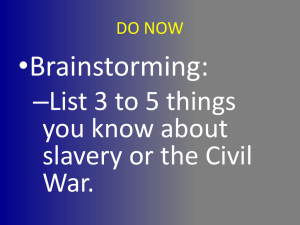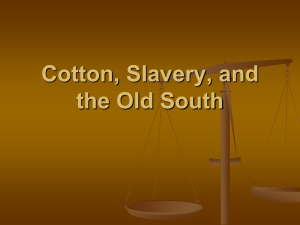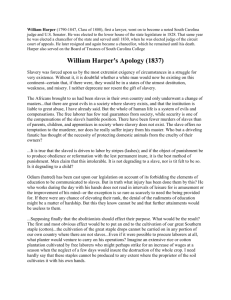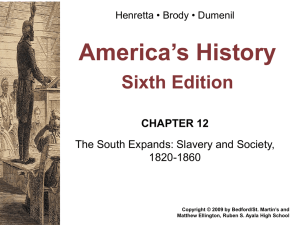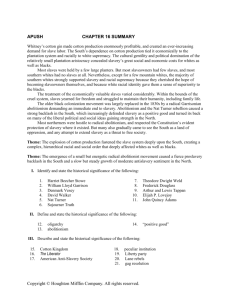Chapter 11 Section 3
advertisement
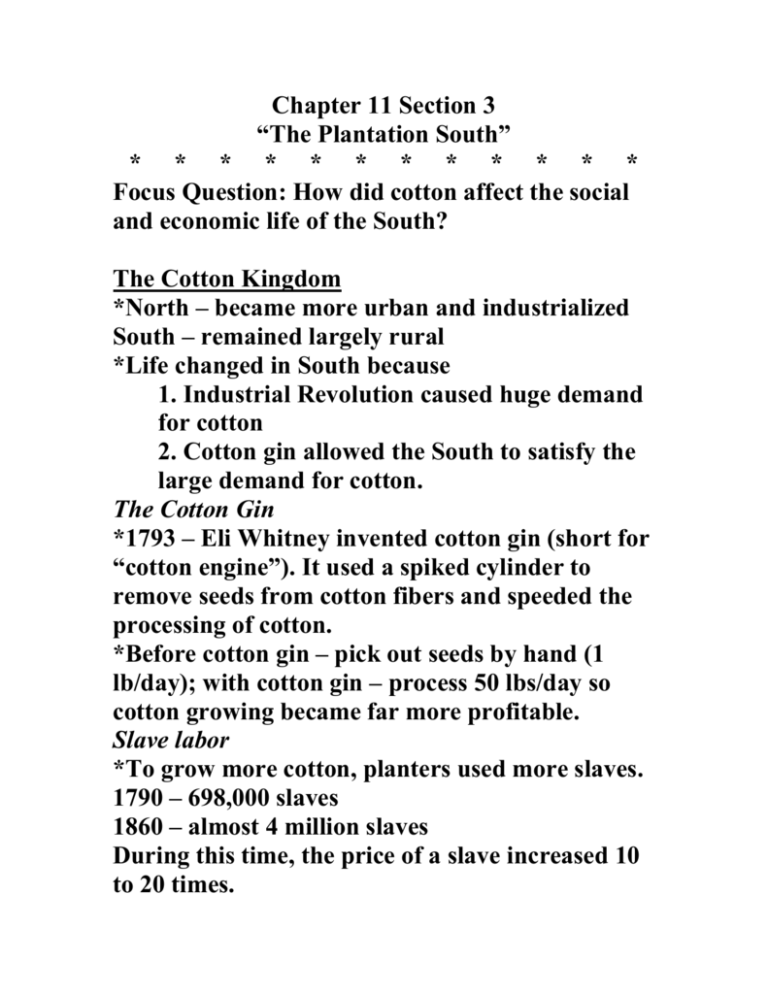
Chapter 11 Section 3 “The Plantation South” * * * * * * * * * * * * Focus Question: How did cotton affect the social and economic life of the South? The Cotton Kingdom *North – became more urban and industrialized South – remained largely rural *Life changed in South because 1. Industrial Revolution caused huge demand for cotton 2. Cotton gin allowed the South to satisfy the large demand for cotton. The Cotton Gin *1793 – Eli Whitney invented cotton gin (short for “cotton engine”). It used a spiked cylinder to remove seeds from cotton fibers and speeded the processing of cotton. *Before cotton gin – pick out seeds by hand (1 lb/day); with cotton gin – process 50 lbs/day so cotton growing became far more profitable. Slave labor *To grow more cotton, planters used more slaves. 1790 – 698,000 slaves 1860 – almost 4 million slaves During this time, the price of a slave increased 10 to 20 times. *Cotton became greatest source of wealth for US. South – enriched planters North – enriched bankers and shipowners *1790 – 1.5 million lbs. of cotton grown 1820 - 10 times more cotton grown *Some states (AL, MS) depended on cotton and used many slaves whereas other states (KY) depended less on cotton and had fewer slaves. *Small but wealthy group of plantation owners dominated the “Cotton Kingdom.” More than half of southern farmers did not have slaves; they grew corn and raised hogs and chickens. Defending Slavery *Most southern whites accepted the system of slavery. Many feared that any weakening of controls over African Americans might encourage violent uprisings. *By 1830s – some northern whites were urging slavery be banned. As a result, southern whites reinforced their support for slavery. *Pro-slavery = slavery was more humane than the free labor system of the North; northern factory workers worried about unemployment but enslaved African Americans did not worry about unemployment. *Anti-slavery = argued that northern workers were free to quit jobs if conditions too harsh; slaves often suffered abuse from owners; freedom! African Americans in the South *4 million slaves in South but about 253,000 (6%) were free. Few slaves did well. Restrictions on Free African Americans *Laws denied rights to enslaved and free Africans Americans. They got the worst jobs and could not vote, serve on juries, or testify against white defendants in court. Their children could not attend schools. *Free African Americans could be captured by slave catchers and sold into slavery. *Norbert Rillieux (African American) – method of refining sugar made the process faster, safer, and less costly. *Henry Blair (Af. Am.) – seed-planting device that reduced the time a farmer spent planting crops. Life Under Slavery *Slaves codes – laws that controlled every aspect of their lives. *Slaves became skilled workers, housekeepers, butlers, nannies, and house servants. They kept the plantations operating smoothly. *Most slaves did farm labor. The slaveholders stopped just short of working the slaves to death. *The only advantage slaves had is slaveholders needed to keep them healthy and productive. Many slave families were broken apart when members were sold. *After 1808 – it was illegal to import slaves. African Americans had little direct contact with Africa. *African customs, music, and dance survived and were passed from one generation to the next. African Americans found hope in the Bible and made spirituals (religious folk songs that blended biblical themes with the realities of slavery. Resistance to Slavery *Slaves tried to resist slaveholders. They worked slowly or pretended not to understand what they were told to do. They broke farm equipment. Some fled north to freedom. *Nat Turner led a slave revolt in 1831. Turner said he had a vision that told him to kill whites. He and others killed about 60 whites. In retaliation, many innocent African Americans were executed. Review Questions *How widespread was slave ownership? Fewer than half of white southerners owned slaves. *How did enslaved African Americans adapt to slavery and resist it? Many adapted to slavery by finding support in the Bible, African customs, and music. Some worked slowly or badly on purpose, some turned to violence, and some escaped.


